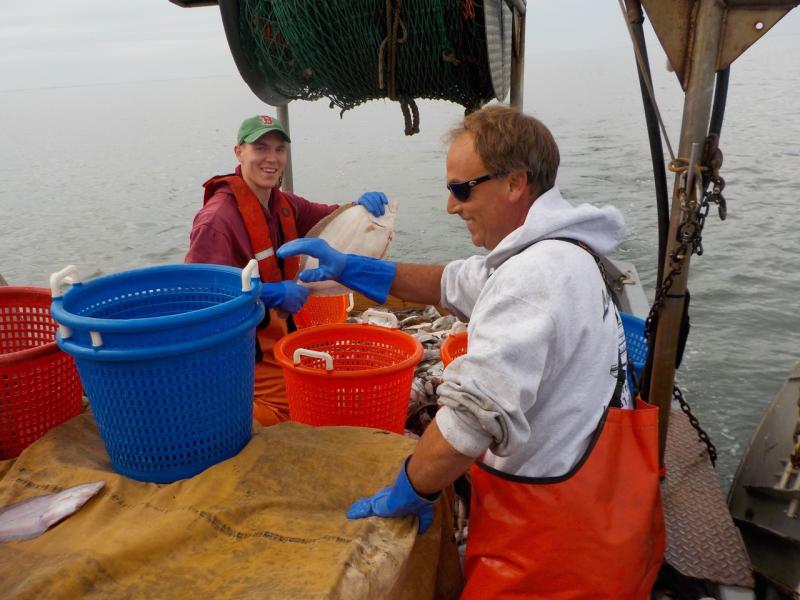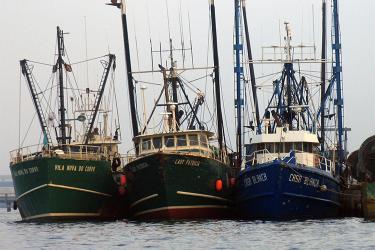The Maine Fishermen’s Forum is an annual gathering of commercial fishermen, gear suppliers, scientists, government representatives, and other stakeholders to talk about Maine’s commercial fishing industry, markets, technology, safety, and more. Scientists from our Science Center and staff from the Greater Atlantic Regional Fisheries Office participate in the Forum to collaborate and share information about Maine’s marine resources and how things like fishing regulations, climate change, and other related factors might impact the day-to-day and long-term operations of the fishing industry. By attending the Forum and participating in its seminars and panel discussions, we continue to build and strengthen our relationships with Maine’s commercial fishing industry and its regional stakeholders.
Here’s where to find our staff in action during the Forum, which is held at the Samoset Resort in Rockport, Maine. We’re speaking at the events listed here. We’re also at the Trade Show, where both the Greater Atlantic Regional Fisheries Office and the Center's Northeast Fisheries Observer Program have booths and are ready to talk.
Director Jon Hare to speak at NOAA Fisheries Leadership Panel
Rockland Room
March 1 at 2:45 PM
Science Center director Jon Hare will be joined by Kim Damon-Randall, Deputy Regional Administrator, and Sarah Heil, Assistant Regional Administrator for Sustainable Fisheries, of NOAA Fisheries’ Greater Atlantic Regional Fisheries Office to participate in the NOAA Fisheries Leadership Panel — an open discussion and opportunity for Maine’s commercial fishing industry, stakeholders, and related partners to share their insights and concerns.
Got Observer Program Questions?
Bay Point Room
February 28 from 3:00 to 5:00 PM
March 1 from 8:30 AM to 5:00 PM
March 2 from 8:30 AM to 4:00 PM
Members of our Fisheries Observer Program will be on hand to talk about the observer program in the Northeast region. Have questions about observer coverage, observer safety, scallop, groundfish or herring information notifications, the omnibus amendment for industry-funded monitoring, standardized bycatch reporting methodology (SBRM), or something else? Then be sure to drop by their booth in the Bay Point Room.
Working with Commercial Fishermen and Lobstermen to Monitor Bottom Temperatures
Monhegan Room
February 28 at 1:00 PM
The environmental monitoring on lobster traps and some large trawlers project known as eMOLT is a collaboration of industry, science, and academics dedicated to monitoring of the physical environment of the Gulf of Maine and the Southern New England shelf. These areas have been experiencing environmental change, including rising ocean temperatures that are causing some commercially and ecologically important species to migrate northward in search of more suitable temperatures. The eMOLT project has been collecting bottom temperature data for nearly two decades and with the help of nearly 100 lobstermen, it’s been a low-cost strategy to measure the physical environment. During the seminar, staff from the Gulf of Maine Lobster Foundation will show how to access eMOLT data and share ways to use the data. They’ll also talk about plans for future information products. Science Center oceanographer and eMOLT pioneer Jim Manning may be available to talk about the eMOLT project remotely. Biological science technician Graham Goulette will be at the Forum to connect with lobstermen and provide acoustic receivers that they’ll deploy in their lobster traps as part of the Center’s tMOLT acoustic telemetry work. Project tMOLT is one component of the Center’s PlatOpus project. PlatOpus uses “platforms of opportunity” — lobster traps, wave gliders, oceanographic buoys — to take advantage of active fishing gear and vessel networks to collect data in ways and locations that would normally be cost-prohibitive.
Fishery-Dependent Data — What’s in It for You?
Rockland Room
March 1 at 9:00 AM
Fishery-dependent data — data collected by commercial and recreational fishing sources — provide critical information that can be used in fisheries management. This seminar focuses on how fishery-dependent data are used, why they’re important, and how it can help fishermen, scientists, and managers make informed management decisions for healthy and sustainable fisheries. John Manderson is a research fisheries biologist with our Science Center and will present data from an ongoing project using fishermen's knowledge to evaluate flatfish distribution in the Gulf of Maine. His study will also be used to estimate catchability of flatfish in Northeast Fisheries Science Center surveys. Sarah Heil, the newly selected Assistant Regional Administrator for Sustainable Fisheries at the NOAA Fisheries Greater Atlantic Regional Fisheries Office will moderate the panel.
The Cost of Quota Leasing in New England’s Groundfish Fishery
Rockland Room
March 1 at 1:00 PM
This seminar with focus on the cost of leasing annual catch entitlements in the Northeast groundfish fishery. In 2010, most of the groundfish fleet switched from the days-at-sea management system to the “sectors” system that allows groups of vessels to buy, sell, and lease stock-specific quotas (annual catch entitlements) to stay within hard catch limits. Under this system, the most constraining stocks should see the highest quota prices. Science Center economist Chad Demarest will talk about estimated quota costs and estimated impacts on net profit. Panel members will also discuss the pros and cons of various quota price control strategies and how they’re used elsewhere, and compare and contrast costs of leasing fishing days under the prior days-at-sea system.
Update on Right Whale Status, Research, and Potential Regulations
Rockland Room
March 1 at 10:30 AM
If you attend, expect updates on the status of endangered North Atlantic right whales, entanglements, potential management actions to reduce entanglement risk, pending court cases, and the ongoing Maine DMR vertical line research project. A new prototype for the Time Tension Line Cutter will be demonstrated. There will also be a discussion period for industry members to gather feedback on the Maine proposal for new regulations in the Atlantic Large Whale Take Reduction Plan. Mike Asaro, who leads the marine mammal/sea turtle recovery effort at the NOAA Fisheries Greater Atlantic Regional Fisheries Office, will be on the panel.



